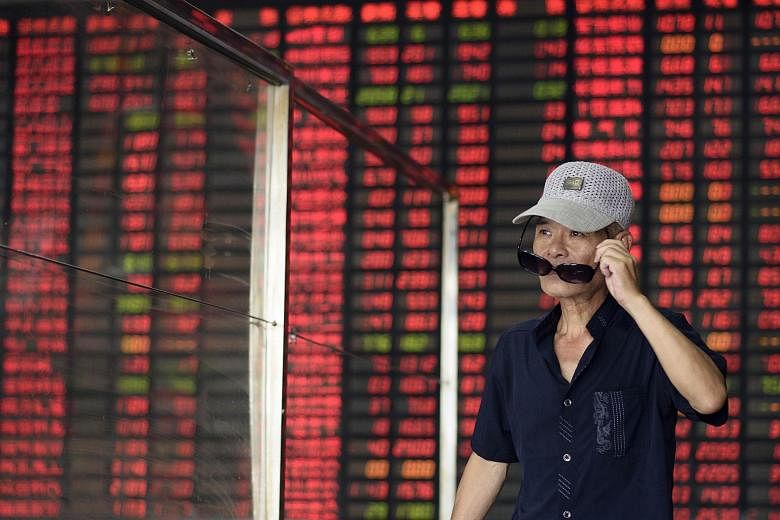SHANGHAI (BLOOMBERG) - China's stocks fell, sending the benchmark index toward the lowest level in three weeks, as declines in manufacturing gauges added to signs of a deepening economic slowdown.
The Shanghai Composite Index slid 2.4 per cent to 3,574.80 at the 11:30 a.m. break, poised for the lowest close since July 8. PetroChina Co. led a slump for energy shares, sliding 4.7 per cent. Technology and industrial companies also dropped. The benchmark gauge is trading near its 200-day moving average of 3,560.22, a level that's closely watched by analysts who use price patterns to develop trading strategies.
The Shanghai Composite posted its steepest monthly drop since August 2009 amid concern economic growth is faltering at a time traders are cutting their leveraged bets and a flood of market-support measures isn't reviving interest in equities. A private factory gauge released on Monday fell to a two-year low in July, while an official index on Saturday slipped to a five-month low amid a drop in new orders and jobs.
"The recent economic data have made investors believe that the market isn't supported by earnings or fundamentals, particularly when the market is in a downward cycle," said Wang Zheng, the Shanghai-based chief investment officer at Jingxi Investment Management Co. "Even after the decline, some stocks are still expensive."
The median stock on mainland bourses traded at 66 times reported earnings on Friday, higher than in any of the world's 10 largest markets, according to data compiled by Bloomberg. That compares with a multiple of 13 in Hong Kong.
The CSI 300 Index retreated 1.4 per cent. Hong Kong's Hang Seng China Enterprises Index fell 1.7 per cent, while the Hang Seng Index lost 1.1 per cent.
Trading volumes in Shanghai were 48 per cent lower than the 30-day average.
Margin traders reduced holdings of shares purchased with borrowed money for a sixth day on Friday, with the outstanding balance of margin debt on the Shanghai Stock Exchange falling to a four-month low of 860 billion yuan (S$190.23 billion).
The Shanghai gauge fell 14 per cent last month, the biggest loss among 93 global benchmark gauges tracked by Bloomberg, even as the government armed a state-run financing agency with more than US$480 billion to bolster the market, allowed hundreds of companies to suspend share trading and banned major shareholders from selling stocks.
As of Monday morning, 509 companies remain halted from trading on the Shanghai and Shenzhen stock exchanges, down from 526 at the close on Friday, according to data compiled by Bloomberg.
The share suspensions are a source of frustration for investors, strategists led by Roger Xie at HSBC Holdings wrote in a report dated July 31. Among the mainland companies still suspended, more than 60 per cent have been halted for more than a month, they said.
As state-linked funds intervene to prop up the nation's sinking stocks, PetroChina has transformed into a speculative bet on how much money the government is plowing into equities on any given day. The US$310 billion oil producer's top weighting in the Shanghai Composite makes it an ideal target for funds trying to influence the broader market.
The result has been a surge in PetroChina's volatility to the highest level among the world's 100 biggest companies - fluctuations so big that they top 95 per cent of the stocks in America's small-cap Russell 2000 Index. The swings are another sign of how state intervention is leading to price distortions in the world's second-largest equity market.

